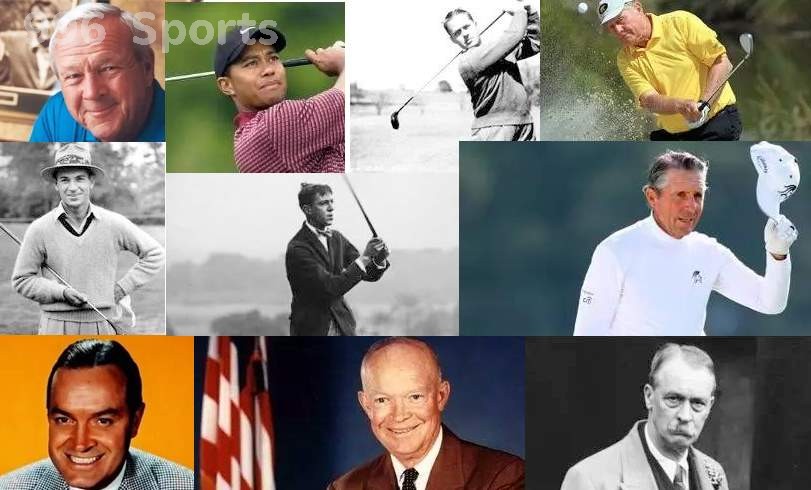The 10 most influential figures in golf history

Recently, senior American media ranked the top 10 individuals in the history of golf who have made the most contributions and had the greatest influence. Former golf king Palmer, fallen world number one Tiger Woods, actors to politicians, businessmen to writers have all been included in this list. Senior golf commentators in the United States have evaluated the contributions made by these 10 individuals to the golf industry, and we will reveal them one by one for you. Arnold Parr is known as the king of golf.
1. Arnold Palmer: The King of Golf, whose rise coincided with the rise of golf television, which meant he was the first golf star known to people. He is a crazy golf genius and one of the pioneers of the television sports era. Some have won more Grand Slam tournaments than him, while others have won more tours and prize money, but no one has ever been able to catch up with his influence. The history of golf is directly attributed to Arnold Palmer. He has made unparalleled contributions to the popularization of golf today, and to this day, he is revered and loved by fans no matter where he is.
2. Tiger Woods: Tiger has had a transformative impact on golf over the past forty years, bringing diversity into a game that was once only accessible to white people. He has not only become a golfer but also a cultural icon. After more than 10 seasons of various sizes, Tiger Woods has won a total of 62 professional tournament championships, including 46 from the PGA Tour and 10 Grand Slam titles. He is the first golfer to have won so many Grand Slam tournaments before the age of 30, and after the retirement of the previous generation golf king, "Golden Bear" Nicolas, Tiger has become an undisputed king in today's golf world. Numbers exceeding seven digits on the bank card are still a strong proof of his status as a king. He is the best and most influential golfer in the world.
3. Bobby Jones: Without a doubt, he is the best player in history and has lived a legendary "amateur" life. Throughout his life, he received numerous honors, including being a member of the Golf Hall of Fame, being named after five American Walker Cup teams, serving as the captain of two American Walker Cup teams in 1928 and 1930, founding Augusta Golf Club, and receiving the annual Sportsmanship Award named after him from the USGA. The most famous one was the 1925 US Open, where he penalized himself with two strokes, bringing the elegant and gentlemanly spirit of golf into the competition. In 1930, at the age of 28, after winning consecutive championships in the British Open, British Amateur Championship, US Amateur Championship, and US Open, setting an unprecedented record (the annual Grand Slam at the time), he suddenly announced his retirement, leaving behind a history that was both anticipated for his comeback but could only be remembered forever.
4. Jack Nicklaus, also known as the "Golden Bear," has long been associated with significant events on the golf course. 18 professional championship titles, stunning one shot hole, and never give up willpower; Jack's achievements are so legendary. I have won more Grand Slam tournaments than anyone else in the past. His competition with his opponent Arnold Palmer brought about the golden age of golf, and his victory at Augusta in 1986 was hailed as the greatest victory in history.
5. Francis Ouimet: If we were to talk about a game that changed the history of golf, it would undoubtedly refer to the 1913 US Open, which was the year when Francis Ouimet (an unknown amateur player) defeated the then golf superstars Harry Varden and Teddy to become the champion. He immediately became an international news, later consolidating the development of golf and constantly affecting the public's nerves. He changed America's perception of golf and inspired generations of amateur golfers to participate in tournaments that were previously only accessible to elites and private members.
6. Ben Hogan: Hogan was already one of the greatest players in the world back then. In 1953, Hogan won five out of the six major tournaments he participated in, and also won three Grand Slam tournaments that same year, earning him the title of "Hogan Grand Slam". Hogan's self created swing theory was highly influential, and he was one of the first golfers to use different clubs at different distances and use sandpits or trees to determine the swing distance. He won a total of 9 Grand Slam championships in his lifetime, ranking fourth in history.
7. Gary Player: A legendary South African golfer known as the "Black Knight". Gary Pryor has won 9 Grand Slam tournaments in his career, including 3 American Masters titles. He was also the first non American player to win the US Masters in 1961, and he is also the professional player with the most travel and playing history in the world.
8. Bob Hope: If Eisenhower filled golf with solemnity, Hope endowed it with "character". He is the best and most entertaining ambassador in golf competitions in recent years. He has won four Academy Awards and can play with presidents, kings, celebrities, and even two-year-old children. At present, the Hope Elite tournament named after him is also the only one on the PGA Tour that features a round robin format.
9. Dwight Eisenhower: The association between the president and golf is largely due to Eisenhower's passion for golf. During his tenure, he initiated nearly 800 matches, almost 100 rounds a year, and the popularity of golf far exceeded its traditional boundaries. He is the first president of the World Golf Hall of Fame.
10. Samuel Ryder: In the late 19th century, Ryder founded a company in St. Albans and made a lot of money from selling small bags of plant seeds. Later, Ryder became obsessed with golf and joined the Walulam Golf Club. In 1923, Ryder, who had been obsessed with golf, decided to sponsor a golf tour under his company's name. Samuel? Samuel Ryder donated a trophy worth £ 750 as the trophy for the biennial pit match between the United Kingdom of Great Britain and Northern Ireland and the United States. Thus, the first edition of the "Ryder Cup" was officially born in 1927.
